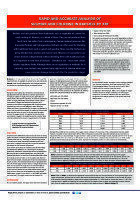Analytical Instrumentation
Rapid and Accurate Analysis of Sulphur and Chlorine in Biofuels by XRF
Dec 08 2021
Author: XOS on behalf of XOS
Biofuels are fuels produced from feedstocks such as vegetable oil, animal fat, used cooking oil, biomass, or a blend of these. They are not produced from fossil fuels, but rather from contemporary, human-induced processes like transesterification and hydrogenation. Biofuels are often used for blending with traditional fuels such as gasoil and gasoline. More recently, biofuels are being blended into aviation and marine fuels. However, it is possible to use certain biofuels independently without blending them with traditional fuels. It is important to note that all biofuels – blended or not – must meet certain sulphur regulatory limits. Although there are no regulations or methods for it currently, some biofuels may contain fairly high levels of chlorine which can cause corrosion damage during and after the production stages.
In this study, we will use Sindie +Cl to test sulphur and chlorine in eight real-world samples, including both first and second-generation biofuels as well as the traditional biofuels they are typically blended with.
Digital Edition
PIN 25.3 June/July
June 2024
Analytical Instrumentation - Recent Advances In Various Bench Scale Accelerated Oxidative Testing Methods For Fuels - Petrochemical Industry: Anton Paar Solutions Streamline Processes, Reduce H...
View all digital editions
Events
Jul 30 2024 Jakarta, Indonesia
Jul 30 2024 Jakarta, Indonesia
China Energy Summit & Exhibition
Jul 31 2024 Beijing, China
Jul 31 2024 Chengdu, China
Aug 05 2024 Moon Township, PA, USA















